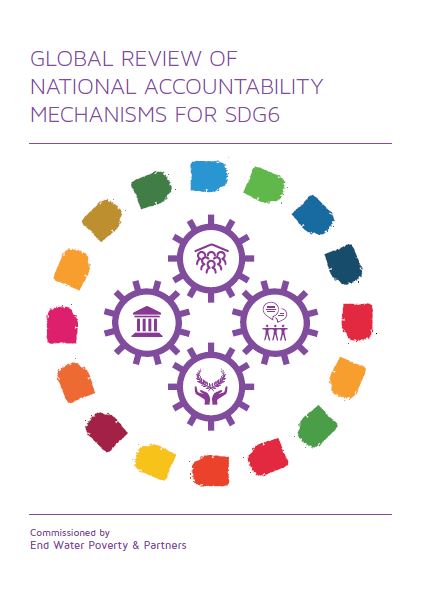Global review of national accountability mechanisms for SDG6
 |
Étude des organisations de la société civile pour la mise en oeuvre de l’ODD 6
report Jul 2018 ; 180 pages
Aut. Catarina Fonseca & Laura Van de Lande
Ed. Coalition Eau - Nogent sur Marne End Water Poverty - London WSSCC - Genève Watershed Empowering Citizens Consortium - Amsterdam
Downloadable format: PdF
Downloadable from the publisher
Editor Presentation
other Editor Presentation
 Résumé (français, anglais, espagnol)
Résumé:
Résumé (français, anglais, espagnol)
Résumé:End Water Proverty, Watershed, la Coalition Eau et WSSCC ont participé à l’élaboration d’un rapport mondial sur les mécanismes de redevabilité nationaux pour la mise en oeuvre de l’ODD 6 sur l’eau et l’assainissement, publié en juillet 2018 à l’occasion du forum politique de haut niveau (en anglais). Le résumé de cette étude, ainsi que ses messages clés, sont disponibles en français. Abstract:
This study took place between October 2017 and March 2018 and was led by civil society organisations (CSOs) in 25 countries under the umbrella of End Water Poverty, Watershed Consortium, Coalition Eau and the Water Supply and Sanitation Collaborative Council (WSSCC). Organisations agreed to conduct an in-depth inclusive analysis on country-level accountability mechanisms towards Sustainable Development Goal 6 (SDG 6) on clean water and sanitation implementation and produce a comprehensive report, assessing their strengths, limitations and effectiveness.
The outcomes of this study include enhanced insights on the existing in-country mechanisms and their functioning for SDG 6, resulting in tools for CSOs to find more or better ways to hold their government accountable for reaching SDG6 targets and meaningful reporting on progress. It identifies positive experiences of participating in existing accountability mechanisms, as well as the greatest gaps and challenges currently observed in the functioning of accountability mechanisms, from the perspective of governments, civil society and other stakeholders.
The process and the results of the study therefore aim to strengthen CSOs' capacities to advocate for improved accountability mechanisms and their involvement in decision-making and follow-up actions.
Keyword: |
Publishers/Broadcasters: |
|
Coalition Eau - Nogent sur Marne |
End Water Poverty - London - United Kingdom |
WSSCC
-
Water Supply and Sanitation Collaborative Council - Genève - Switzerland |
Watershed Empowering Citizens Consortium - Amsterdam - Netherlands |
IRC - Den Haag - Netherlands |
If there is a broken link, we will be pleased to receive a message: communication@pseau.org